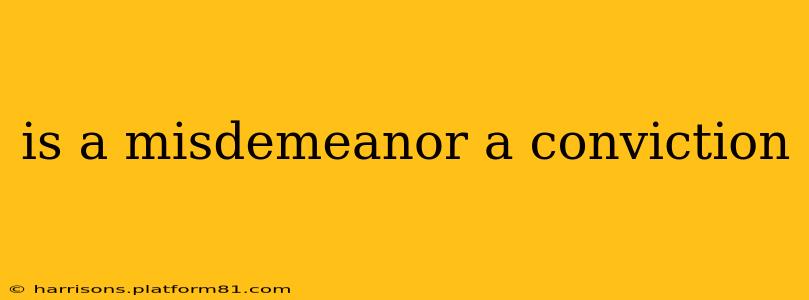Yes, a misdemeanor is a criminal conviction. While less serious than a felony, a misdemeanor conviction is still a formal finding of guilt by a court of law and carries significant consequences. Understanding the implications of a misdemeanor is crucial for anyone facing such a charge. This guide will clarify what constitutes a misdemeanor conviction and explore its potential ramifications.
What is a Misdemeanor?
A misdemeanor is a less serious crime than a felony, typically punishable by a fine, jail time of less than one year, or both. Specific penalties vary widely depending on the jurisdiction (state or local laws) and the nature of the offense. Examples of misdemeanors include:
- Simple assault: Non-aggravated assault involving minor physical harm.
- Shoplifting (petty theft): Theft of goods with a relatively low value.
- Vandalism: Damage to property, typically with a low monetary value.
- Driving under the influence (DUI) – first offense (in some jurisdictions): Operating a motor vehicle while impaired.
- Disorderly conduct: Public disturbances involving disruptive behavior.
Is a Misdemeanor a Criminal Record?
Absolutely. A misdemeanor conviction becomes part of your criminal record. This record is accessible to various entities, including potential employers, landlords, and licensing boards. The accessibility and impact of this record vary depending on the jurisdiction and the specifics of the case.
What are the Consequences of a Misdemeanor Conviction?
The consequences of a misdemeanor conviction can be far-reaching and extend beyond the immediate penalties imposed by the court. These consequences can include:
- Fines: Monetary penalties imposed by the court.
- Jail time: A period of incarceration, typically less than a year.
- Probation: Supervision by a probation officer with conditions that must be met.
- Community service: Unpaid work performed for the benefit of the community.
- Loss of certain rights: This could include the right to vote, own a firearm, or obtain certain professional licenses.
- Impact on employment: Many employers conduct background checks and may hesitate to hire individuals with criminal records.
- Difficulty in securing housing: Landlords may be reluctant to rent to individuals with misdemeanor convictions.
- Increased insurance premiums: Misdemeanor convictions, particularly DUI convictions, can significantly increase car insurance premiums.
How Long Does a Misdemeanor Stay on Your Record?
The length of time a misdemeanor remains on your record varies significantly by jurisdiction and the type of offense. Some states have laws allowing for expungement or sealing of misdemeanor records after a certain period, while others do not.
Can a Misdemeanor be Expunged?
In some jurisdictions, it is possible to petition the court to expunge or seal a misdemeanor record after a specific time has passed and certain conditions are met. The process and eligibility criteria for expungement vary greatly depending on state and local laws.
What is the Difference Between a Misdemeanor and a Felony?
The key difference lies in the severity of the crime and the potential punishment. Felonies are more serious crimes with penalties ranging from lengthy prison sentences to life imprisonment. Misdemeanors are less serious offenses with typically shorter jail sentences or alternative punishments.
How Can I Avoid a Misdemeanor Conviction?
The best way to avoid a misdemeanor conviction is to avoid committing crimes. If you are facing a misdemeanor charge, seeking legal counsel from a qualified attorney is crucial. An attorney can help you understand your rights, navigate the legal process, and potentially negotiate a favorable outcome.
This information is for general educational purposes only and should not be considered legal advice. Always consult with a legal professional for guidance on specific legal matters.
